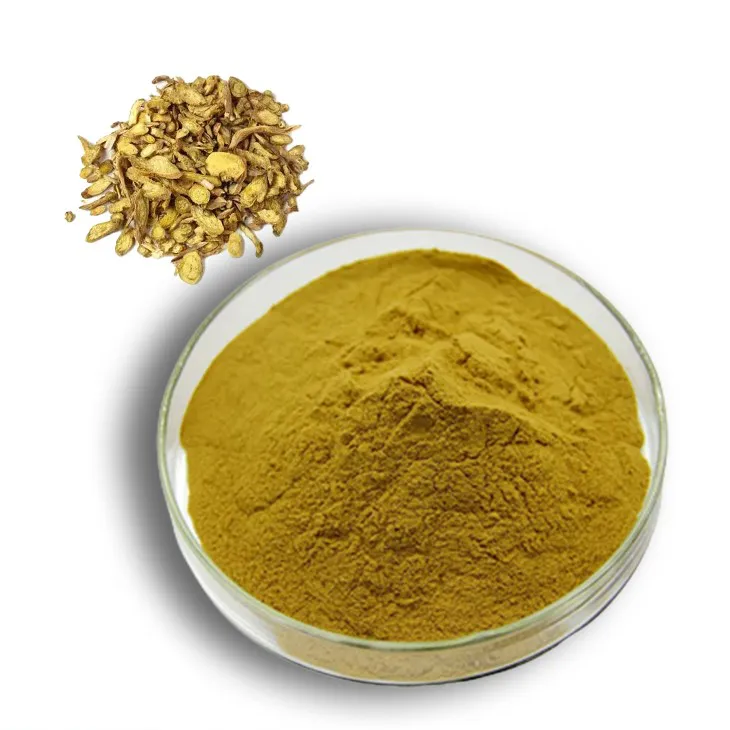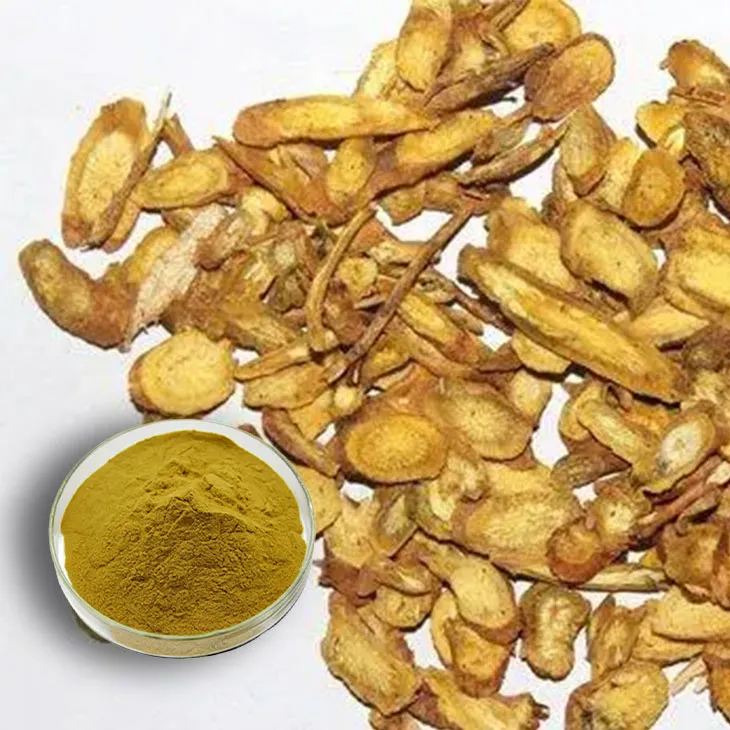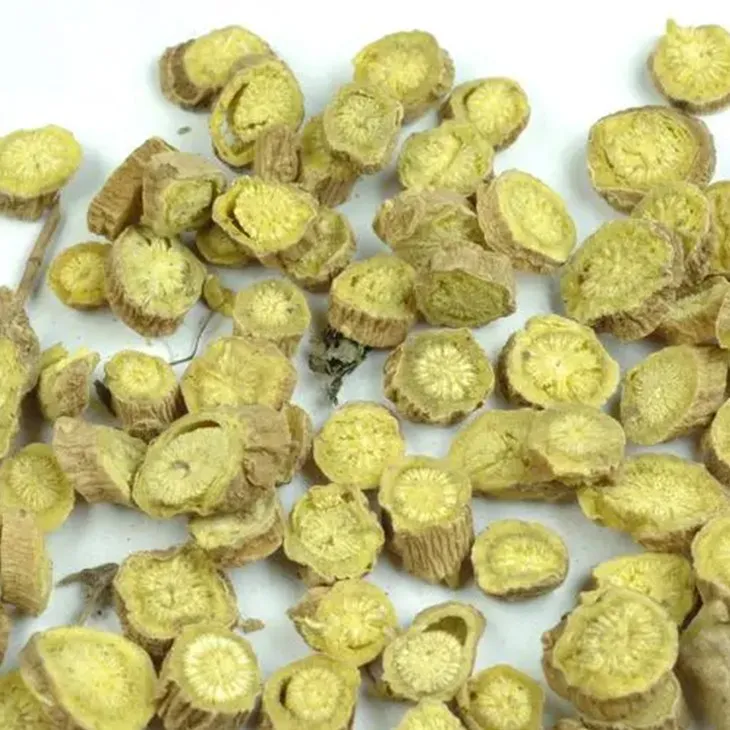- 0086-571-85302990
- sales@greenskybio.com
Uncover the Secret: 8 Reasons You Must Know about Baicalin.
2024-12-13

1. Introduction
Baicalin, a natural compound, has been drawing increasing attention in the field of medicine and health. It is derived from the roots of Scutellaria baicalensis Georgi, a traditional Chinese medicinal herb. With a wide range of potential health benefits, it is crucial to understand the various aspects of Baicalin. In this article, we will explore eight must - know reasons about Baicalin.

2. Strong Antioxidant Properties
Antioxidants play a vital role in maintaining our health. Baicalin is known for its strong antioxidant properties. Free radicals, which are unstable molecules in the body, can cause oxidative damage to cells. This damage is associated with various diseases, including cancer, cardiovascular diseases, and neurodegenerative disorders.
Baicalin can combat free radicals in several ways. It can donate electrons to stabilize these unstable molecules, thereby preventing them from reacting with and damaging cellular components such as DNA, proteins, and lipids. For example, in vitro studies have shown that baicalin can effectively scavenge superoxide anions, hydroxyl radicals, and other reactive oxygen species.
Moreover, compared to some synthetic antioxidants, baicalin may have fewer side effects. This makes it a potentially attractive option for long - term use in promoting overall health and preventing chronic diseases.

3. Remarkable Anti - Inflammatory Effect
Inflammation is a natural response of the body to injury or infection. However, chronic inflammation can lead to a variety of health problems. Baicalin has been found to have a remarkable anti - inflammatory effect.
It can modulate the body's inflammatory response at multiple levels. For instance, baicalin can inhibit the activation of certain inflammatory cells, such as macrophages and neutrophils. These cells are important in the initiation and propagation of the inflammatory process. By suppressing their activation, baicalin can reduce the production of pro - inflammatory cytokines, such as interleukin - 1β (IL - 1β), interleukin - 6 (IL - 6), and tumor necrosis factor - α (TNF - α).
Additionally, baicalin can also interfere with the inflammatory signaling pathways. For example, it has been shown to inhibit the nuclear factor - κB (NF - κB) pathway, which is a key regulator of inflammation - related gene expression. This inhibition can further dampen the inflammatory response and potentially alleviate various inflammatory conditions, such as arthritis, inflammatory bowel disease, and asthma.

4. Potential Antimicrobial Activity
Another important aspect of baicalin is its potential antimicrobial activity. In the face of increasing antibiotic resistance, the search for new antimicrobial agents is of great significance.
Baicalin has been shown to have activity against a variety of microorganisms. It can inhibit the growth of bacteria, including both gram - positive and gram - negative bacteria. For example, studies have demonstrated that baicalin can effectively inhibit the growth of Staphylococcus aureus and Escherichia coli.
The mechanism of its antimicrobial action may involve multiple factors. Baicalin can disrupt the bacterial cell membrane, leading to leakage of intracellular components and ultimately cell death. It may also interfere with bacterial metabolism or gene expression. In addition to bacteria, baicalin has also shown some antiviral and antifungal activities, although more research is needed to fully understand these effects.

5. Benefits for Liver Health
The liver is a vital organ responsible for numerous physiological functions, including metabolism, detoxification, and synthesis of important proteins. Baicalin could have potential benefits for liver health.
One of the key functions of the liver is to detoxify harmful substances in the body. Baicalin can assist in this process by enhancing the liver's detoxification enzymes. For example, it can up - regulate cytochrome P450 enzymes, which are involved in the metabolism of a wide range of drugs and toxins.
Moreover, baicalin can protect the liver from damage caused by various factors, such as drugs, toxins, and viral infections. It can reduce liver inflammation, prevent liver fibrosis, and even promote liver cell regeneration. In animal models of liver injury, baicalin has been shown to improve liver function parameters and histological changes.
6. Contribution to the Immune System
A healthy immune system is essential for protecting the body from infections and diseases. Baicalin might contribute to the improvement of the immune system, enhancing the body's defense ability.
Baicalin can modulate the immune response in different ways. It can enhance the function of immune cells, such as lymphocytes and macrophages. For example, it can stimulate the production of antibodies by B lymphocytes, which are important for neutralizing pathogens.
At the same time, baicalin can also regulate the balance between the immune system's pro - inflammatory and anti - inflammatory responses. This balance is crucial for maintaining normal immune function and preventing excessive inflammation or immune suppression. By promoting this balance, baicalin can help the immune system to function more effectively.
7. Potential Anti - Cancer Activities
Cancer is one of the leading causes of death worldwide, and the search for effective anti - cancer agents is an ongoing challenge. There are indications that baicalin could be involved in anti - cancer activities, although more research is needed.
Baicalin has been shown to have anti - cancer effects in vitro and in some animal models. It can inhibit the growth and proliferation of cancer cells through multiple mechanisms. For example, it can induce cell cycle arrest in cancer cells, preventing them from dividing and multiplying.
Baicalin can also promote apoptosis, or programmed cell death, in cancer cells. This is an important mechanism for eliminating abnormal or damaged cells in the body. In addition, it may have anti - angiogenesis effects, which can prevent the formation of new blood vessels that are necessary for tumor growth and metastasis. However, further studies are required to determine its effectiveness and safety in human cancer treatment.
8. Positive Impact on Cardiovascular Health
Cardiovascular diseases are a major health concern globally. Baicalin may have a positive impact on cardiovascular health, such as reducing blood lipid levels.
High levels of blood lipids, such as cholesterol and triglycerides, are risk factors for cardiovascular diseases. Baicalin can lower blood lipid levels by several mechanisms. It can inhibit the absorption of dietary lipids in the intestine, reduce the synthesis of lipids in the liver, and promote the excretion of lipids from the body.
In addition to lipid - lowering effects, baicalin may also have other beneficial effects on the cardiovascular system. For example, it can improve endothelial function, which is important for maintaining normal blood vessel dilation and preventing atherosclerosis. It can also reduce blood pressure and platelet aggregation, further reducing the risk of cardiovascular events.
9. Potential in Improving Skin Health
Skin health is not only related to appearance but also reflects the overall health of the body. Baicalin has shown potential in improving skin health, for example, in treating some skin inflammations.
Skin inflammation can be caused by various factors, such as allergens, irritants, and microbial infections. Baicalin's anti - inflammatory properties can help to reduce skin inflammation, relieve symptoms such as redness, swelling, and itching.
Moreover, baicalin may also have antioxidant effects on the skin, protecting skin cells from oxidative damage caused by environmental factors such as ultraviolet radiation. It can also promote skin cell renewal and collagen synthesis, which are important for maintaining skin elasticity and firmness.
10. Conclusion
In conclusion, baicalin is a compound with a wide range of potential health benefits. Its strong antioxidant properties, anti - inflammatory effect, potential antimicrobial activity, benefits for liver health, contribution to the immune system, potential anti - cancer activities, positive impact on cardiovascular health, and potential in improving skin health make it a compound worthy of further study and exploration. However, more research is still needed to fully understand its mechanisms of action and to develop safe and effective baicalin - based products for human health.
FAQ:
Q1: What are the antioxidant properties of baicalin?
Baicalin has strong antioxidant properties. It can combat free radicals in the body. Free radicals are unstable molecules that can cause oxidative damage to cells. By neutralizing these free radicals, baicalin helps protect cells from this type of damage, which is important for maintaining overall health.
Q2: How does baicalin show its anti - inflammatory effect?
Baicalin's anti - inflammatory effect is remarkable. It likely works by interfering with the inflammatory pathways in the body. It can potentially reduce the production of inflammatory mediators, which are substances that promote inflammation. This can help in alleviating various inflammatory conditions.
Q3: What kind of antimicrobial activity does baicalin have?
Baicalin may play a role in antimicrobial activity. It can help the body resist certain infections. It likely acts against microorganisms such as bacteria, fungi or viruses. However, the exact mechanisms of its antimicrobial action are still being studied.
Q4: How does baicalin contribute to liver health?
Baicalin could have potential benefits for liver health. It can assist in liver protection and detoxification. It may help the liver in processing toxins and removing them from the body more efficiently, and also protect the liver cells from damage.
Q5: In what ways can baicalin improve the immune system?
Baicalin might contribute to the improvement of the immune system. It can enhance the body's defense ability. It may do this by stimulating the production of immune cells or enhancing the function of existing immune cells, but more research is needed to fully understand this process.
Related literature
- The Antioxidant and Anti - Inflammatory Activities of Baicalin: A Review"
- "Baicalin and Liver Health: Recent Research Findings"
- "The Role of Baicalin in Immune System Modulation"
- ▶ Hesperidin
- ▶ citrus bioflavonoids
- ▶ plant extract
- ▶ lycopene
- ▶ Diosmin
- ▶ Grape seed extract
- ▶ Sea buckthorn Juice Powder
- ▶ Beetroot powder
- ▶ Hops Extract
- ▶ Artichoke Extract
- ▶ Reishi mushroom extract
- ▶ Astaxanthin
- ▶ Green Tea Extract
- ▶ Curcumin Extract
- ▶ Horse Chestnut Extract
- ▶ Other Problems
- ▶ Boswellia Serrata Extract
- ▶ Resveratrol Extract
- ▶ Marigold Extract
- ▶ Grape Leaf Extract
- ▶ blog3
- ▶ Aminolevulinic acid
- ▶ Cranberry Extract
- ▶ Red Yeast Rice
- ▶ Red Wine Extract
-
American Ginseng Root Extract
2024-12-13
-
Cranberry Extract
2024-12-13
-
Konjac Powder
2024-12-13
-
Hesperidin
2024-12-13
-
Fenugreek Extract Powder
2024-12-13
-
Natural grape seed extract
2024-12-13
-
Motherwort Extract
2024-12-13
-
Rosemary extract
2024-12-13
-
Saw Palmetto Extract
2024-12-13
-
Elderberry Extract
2024-12-13





















